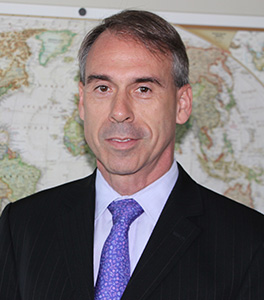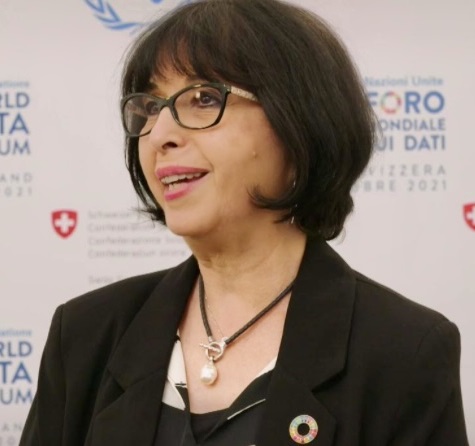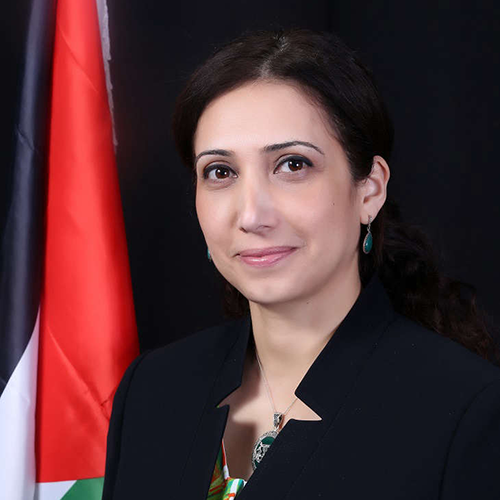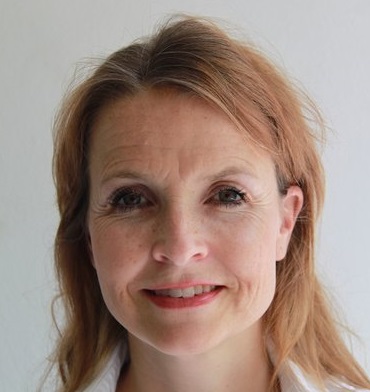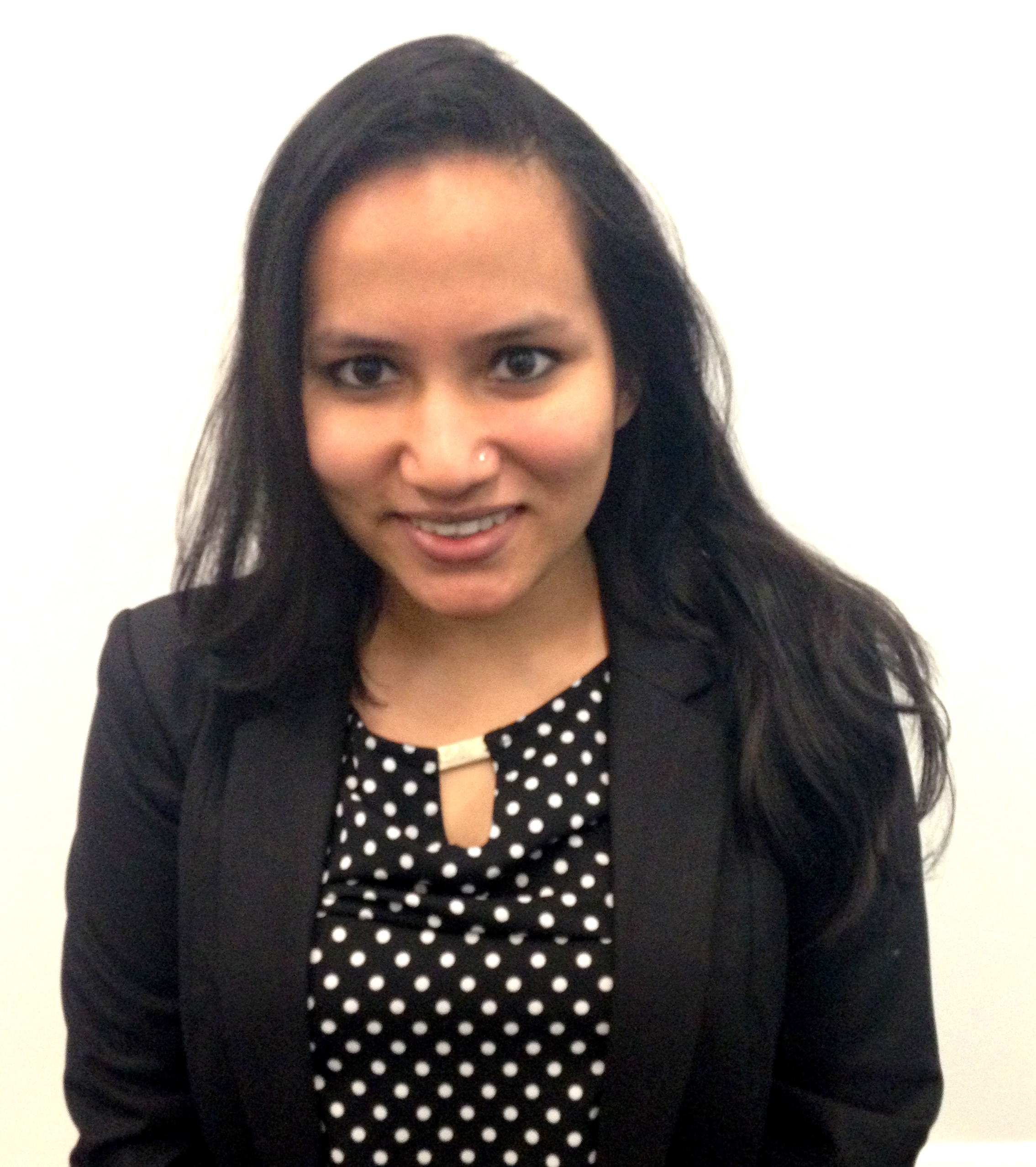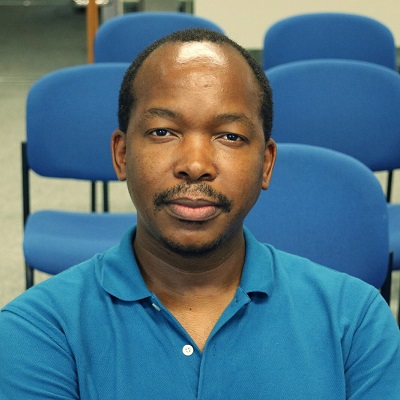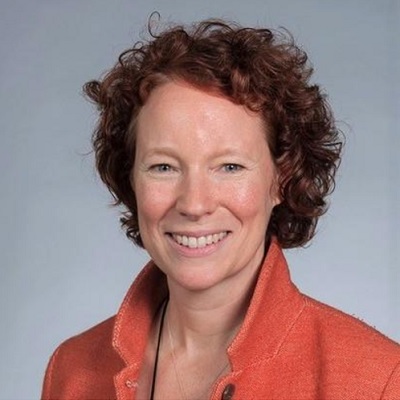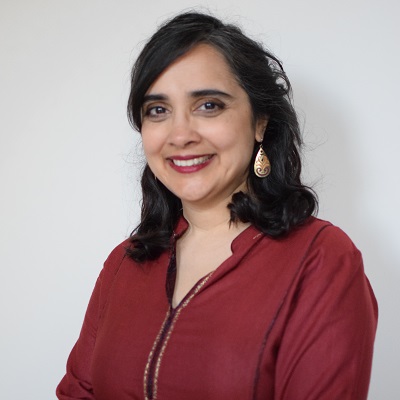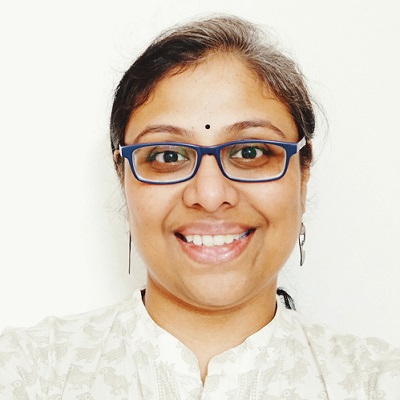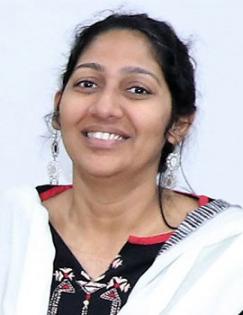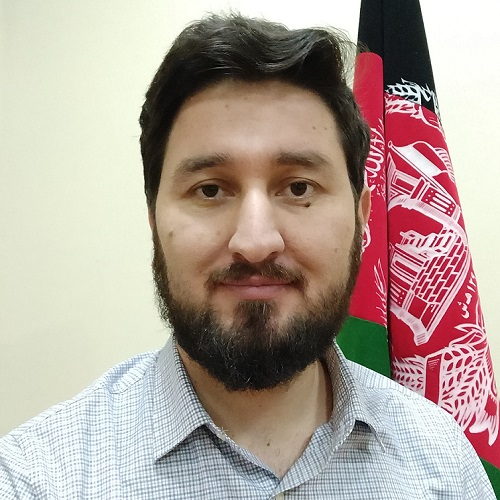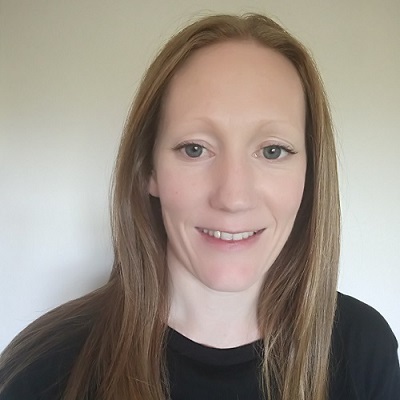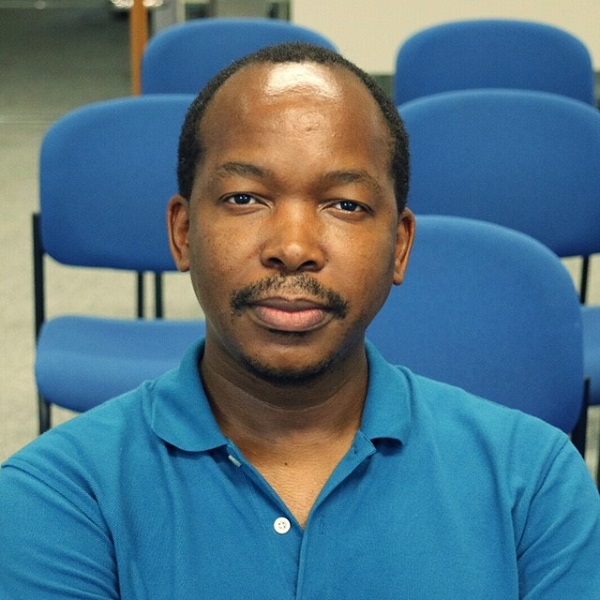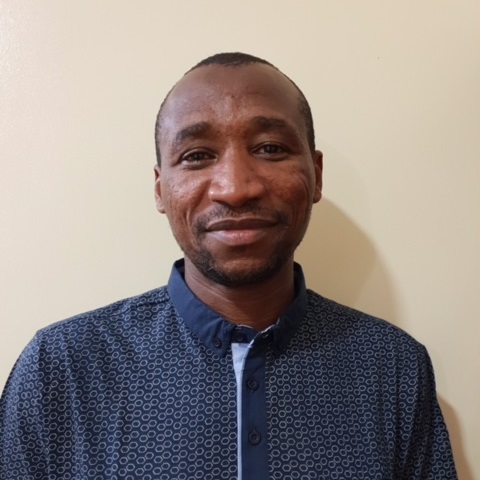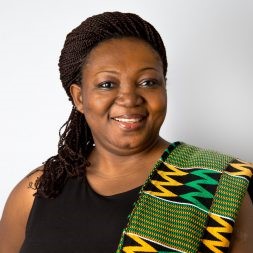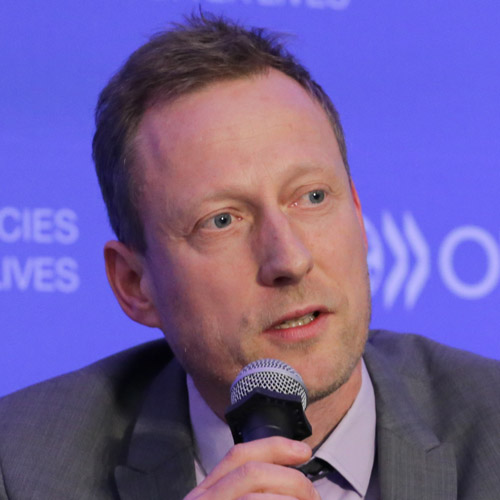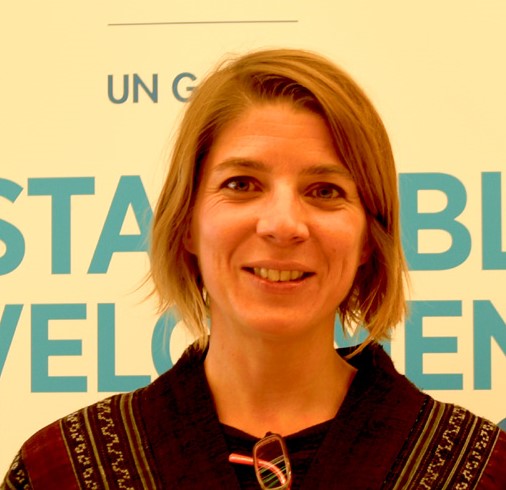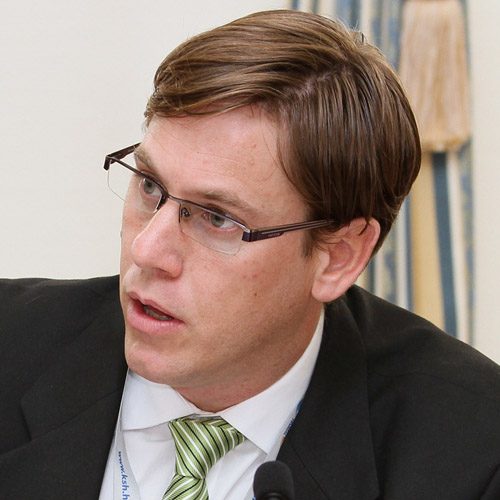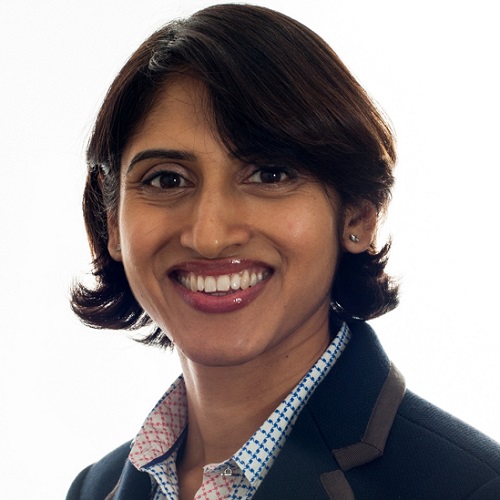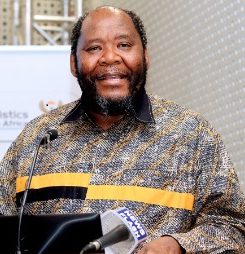How Small Island Developing States Benefit from Digital Twins - Storytelling through Data
Oct 22, 2024
There’s one week to go to enter the UNWDF 2024 ArcGIS StoryMaps Competition, register and submit your entry by Tuesday, 29 October. The competition focuses on telling stories about the world you want to see and draw attention to like the challenges faced by small island developing states (SIDS).
Renewing the Global Action Plan on sustainable development data
Oct 18, 2024
Next month’s UN World Data Forum in Medellin comes at a critical time for the development of data and statistics and a chance to renew our shared agenda. Last month, global leaders gathered here in New York for the beginning of a new session of the UN General Assembly. A Summit of the Future was held just before to discuss global challenges and promote sustainable development focused on future generations. The special Summit concluded with an agreement on three outcome documents; the Pact for the Future, the Global Digital Compact and the Declaration on Future Generations.
What Makes the UN World Data Forum (UNWDF) unique?
Oct 8, 2024
With so many international conferences, what makes the UN World Data UNWDF (UNWDF) different from other global gatherings? As we approach the fifth UNWDF in Medellín this November, I want to reflect on what sets this gathering apart and why it's continued to thrive.
From Cape Town to Medellín: The UNWDF's Role in Advancing the 2030 Agenda
Sept 19, 2024
Since its inception in 2017, the UN World Data Forum (UNWDF) has evolved into a key global event for data and statistics. Starting with 2,000 attendees at its first forum in Cape Town, South Africa, the UNWDF has grown into a vibrant community of over 20,000 participants. This diverse group includes representatives from governments, civil society, private organizations, donor and non-profit entities, international and regional agencies, geospatial professionals, academia, and other stakeholders who are integral to the data ecosystem.
Reflections on the forum/Vision: Count down to the fifth UN World Data Forum: reflecting on our progress as we pass 100 Days…
Aug 13, 2024
After months of preparation, the programme is out, and the registration is open as we pass 100 days until the fifth UN World Data Forum.
This is the fifth forum. The fifth time working with a programme committee. The fifth time working with a host country. The fifth time working with this growing community to make the fifth United Nations World Data Forum a success! Our involvement in the conceptualize and organization of all five Forums has been a remarkable experience for us. When the planning of the first Forum in Cape Town started, it was a monumental task, an exploration into a new arena which set the stage for the series. Many early morning hours were spent framing that first Forum to support the larger statistical and data community of experts. It is very pleasing that many elements are still at the heart of the approaching fifth forum.
Seven lessons we should learn from the pandemic
Dec 13, 2023
In the first two years of the Covid-19 pandemic, countries reported that 5.4 million people died of Covid-19. Tragic as this was, it is almost certainly an underestimate. At WHO we estimate during those same 2 years when we include indirect effects, or what we call excess mortality associated with Covid-19, the death toll was closer to 14.9 million deaths. In 2022 an additional 1.5 million deaths were reported. But for the exchange of scientific data, it could have been much worse.
Governments need more socioeconomic data on forced displacement – here are three ways data innovation can help
Jun 13, 2023
As the number of people around the world forced to flee their homes exceeds 100 million, the need for data to underpin effective responses has never been more urgent. However, the transition from situational assessments to high quality socioeconomic microdata on forced displacement produced by national statistical offices will take time. In the interim, can innovative approaches accelerate and enhance the generation and use of socioeconomic data on forced displacement to inform effective action? The consensus at a workshop held recently at UN City in Copenhagen was ‘yes, it can’, and the most fruitful opportunities identified were rooted in complementing and reinforcing traditional approaches. Convened by the World Bank-UNHCR Joint Data Center on Forced Displacement, the workshop brought together 70 specialists from 20 international organizations, governments, and universities, to collectively brainstorm and chart ways forward.
Innovations in China’s 2020 Population Census
May 26, 2023
Population and housing census is one of the primary sources of data needed for formulating, implementing and monitoring policies and programmes aimed at inclusive socioeconomic development. Over the past decades, methods adopted for the collection of population data have significantly evolved taking advantage of new data sources and technologies.
When data inform decisions for improving the lives of refugees and host communities
May 26, 2023
Refugees and host communities in Kakuma, Kalobeyei and urban areas of Kenya live in better conditions with the help of data-informed policies. One example is the area-based development initiative in the Kalobeyei Integrated Socio-Economic Development Plan, supported by a panel survey on socio-economic conditions. While we increasingly hear of data being turned into valuable information for effective policies, thereby improving the lives of those forced to flee, refugee invisibility in official data collection systems persist.
A global health data governance framework: Maximising public value of health data whilst protecting individual rights
May 23, 2023
The 2023 UN World Data Forum truly highlighted the power of data in advancing the sustainable development goals. However, a recurring theme across many of the Forum’s plenary discussions and sessions was the need for stronger governance of that data. The session on ‘Maximising the public value of health data whilst protecting individual rights’, brought together a panel of experts - including the Minister of Health Zanzibar, WHO, the SDG monitoring section at UNDESA and JSI - to explore some of the challenges and issues around the governance of health data and opportunities to strengthen this, including through a global health data governance framework.
Overcoming Data Graveyards: Country Insights on Advancing Data Use, Uptake, and Impact
May 18, 2023
“You need to be ahead of what your user requires,” stated Macdonald G. Obudho, Director general of KNBS during SDSN TReNDS and Open Data Watch’s UN World Data Forum Event. “If you do not know what your users require, you risk producing data that does not satisfy their needs.”
The many faces of vulnerability: Utilizing non-income data to reveal multidimensional poverty in urban Bangladesh
May 18, 2023
In a world that is increasingly faced with crises such as the COVID-19 pandemic, the Ukraine-Russia war, and rising costs of living, accurately identifying the vulnerabilities of deprived groups requires more than just consumption-expenditure-centered measures of poverty and commensurate data on income.
UndercoverEisAgenten Demonstrates the Power of Citizen Science
May 17, 2023
The second thematic area of United Nations World Data Forum 2023 focuses on the use of reliable data and statistics to generate insightful knowledge for decision and policymakers to improve people's lives. This blog outlines how analysis of crowdsourced data can enable early prediction of disease spread, allowing for necessary actions to combat a pandemic.
How can Participatory Syndromic Surveillance enhance Early Warning Systems for Emerging Infectious Diseases?
An Innovative approach in Bangladesh helped in early detection of the Covid-19 outbreak.
May 16, 2023
The second thematic area of United Nations World Data Forum 2023 focuses on the use of reliable data and statistics to generate insightful knowledge for decision and policymakers to improve people's lives. This blog outlines how analysis of crowdsourced data can enable early prediction of disease spread, allowing for necessary actions to combat a pandemic.
The Power of Environmental Disclosure: Strengthening Data Ecosystems for Policymakers with Better Business Data
May 15, 2023
Corporations are a major contributor to environmental change – so also critical players in our ability to stop it. Public companies are responsible for an estimated 40% of global greenhouse gas emissions; the operations of four major value chains account for more than 90% of anthropogenic pressure on biodiversity; and globally, 80% of wastewater is discharged untreated.
Closing the data gap on children with disabilities: The case for data harmonization and partnerships
May 15, 2023
An estimated 240 million children have some form of disability. Sadly, many of these children continue to be left behind. This, despite near-universal ratification of the Convention on the Rights of the Child, the call for action embedded in the Convention on the Rights of Persons with Disabilities, and the principle of inclusivity set by the Sustainable Development Goals (SDGs). The lack of high-quality data on children with disabilities and the environmental barriers they face hinders the development of policies and programmes that could give these children the specific support they need. When absent from official statistics, children with disabilities are politically and socially ‘invisible’. They remain marginalized and exposed to violations of their human rights.
Measuring the state of data for public good and the achievement of the SDGs
May 12, 2023
With the end of April also came the end of a week full of presentations and discussions around the key role of data for sustainable development in the context of the United Nations World Data Forum (UNWDF) 2023 , held in Hangzhou, China. There are several important messages to extract from the presentations at the UNWDF, but this post will focus, in particular, on the role of data in monitoring progress of the development goals (SDGs).
Collecting inclusive poverty data: what partnership made possible in Tonga
May 11, 2023
The International Women’s Development Agency (IWDA) in partnership with the Tonga Statistics Department (TSD), and in collaboration with the Tonga Ministry of Internal Affairs, Women’s Affairs and Gender Equality Division, implemented the Equality Insights Rapid Survey in Tonga in 2022. This innovative tool has been used for implementing the first nationally representative, official individual-level, gender-sensitive measure of multidimensional poverty conducted in the Pacific region. In this blog we briefly reflect on the development of the tool and lessons learned from adaptation and implementation in Tonga. In doing so we contribute to the ‘Innovation and Partnerships for better and more inclusive data’ thematic area UN World Data Forum 2023 and the panel discussion on finding practical solutions to gender data gaps and moving gender data up the value chain.
Geospatial Innovation's Potential for Addressing Mosquito-Borne Diseases
May 11, 2023
Vector-borne diseases have been on the rise as urbanization brings more people into contact with disease-spreading insects. This phenomenon is typified by the mosquito Aedes Aegypti, responsible for the spread of Zika, chikungunya, yellow fever, and dengue. A 30-fold rise in incidences over the last half-century demonstrates the urgency of employing efficient and targeted vector control methods that can also be utilized in resource-stretched environs in the Global South. Geospatial innovation, including the methods detailed in this blogpost, are helping advance the effort to control vector-borne disease spread.
Farmer-Centric Data Governance Models: Protecting Farmers and Food Systems Today and Tomorrow
May 8, 2023
Smallholder farmers are increasingly using digital technologies (i.e., AgTech) to increase their profits and production, improve processes, and reduce risks. In doing so, many farmers have significantly increased the value of their work.
After all, AgTech platforms offer many positive features including: openness, interoperability, network effects, control over market entry and participation, and the ability to reshape economic relationships and rationalities.
Air raids, power cuts, and many, many questions ‐ collecting data at a time of war
May 8, 2023
Active conflicts make for a perilous backdrop for research, dangerous for researchers and survey respondents alike. Ongoing violence, landmines, checkpoints, and other restrictions prevent researchers from physically moving around to obtain a comprehensive picture of what is happening, making it difficult to determine what needs humanitarian response should address with priority, and where.
Unlocking the Public Sector Potential: The Crucial Role of Government Chief Data Officers
April 20, 2023
As governments handle greater volumes of data and respond to increasingly complex technological regulation and global development challenges, it becomes essential that governance structures are in place to help promote the responsible and efficient use of this information. Equally important, if not more so, is the existence of leadership figures capable of effectively managing these regulations for the use, reuse and sharing of data to deliver public services for the common good.
Leave no migrant behind: Why data disaggregation by migratory status is critical to the 2030 Agenda in Asia and the Pacific and beyond
April 19, 2023
In consonance with the aim of the UN World Data Forum to build a pathway for better data in support of the implementation of the 2030 Agenda, and particularly Thematic Area 2 which calls for maximizing the use and value of data for better decision making, we argue that data disaggregation by migratory status is critical to ensuring migrants are not left behind in this global agenda.
Putting Mobile Phone Big Data to work for Policy and Official Statistics
April 11, 2023
As COVID-19 restrictions started to take hold in The Gambia at the onset of the pandemic, policymakers there turned to an innovative resource to track population movement patterns: Mobile Phone Big Data (MPD). In the framework of a World Bank-supported project, the Gambia Bureau of Statistics collected and analyzed 2 billion individual anonymized call records from two of the four telecom operators—covering 70% of the population—and found that COVID-19 reversed traditional migration trends. The timely and high-resolution insights gained from this data were instrumental in tracking the virus’s potential spread and creating an evidence base for the government’s relief and recovery efforts.
How to maximize the use of data for better decision making around cutting CO2?
April 10, 2023
Answers to some of the world's most pressing questions might be locked into the world's ever-growing databases. Data and effective data systems are crucial to realizing the 2030 Agenda and the Sustainable Development Goals. Only in context with other data, it can enfold its whole value. The UN World Data Forum (UNWDF), plays an important role in supporting efforts to leverage the value of data to support better policy making and address pressing global challenges. A critical global challenge is managing climate change and cutting carbon emissions. Data through better discoverability, analysis and communication can help support climate action and equip governments and companies with the knowledge and capacity to design solutions to cut carbon emissions.
Measuring SDG 16: a path forward for justice institutions
April 4, 2023
As reflected by Thematic Area number 2 of United Nations World Data Forum, making relevant public data available, and enhancing their re-use and value creation for better decision making, are crucial for governments and public institutions to be able to improve peoples’ lives while being accountable for their policies and actions. Open data practices (i.e., the publication of data that can be freely used, re-used and redistributed by anyone) are, in this context, a means to drive social change through accountable, evidence-based policing and participatory monitoring of the advancements of the 2030 Agenda.
Open Data Matters: Getting Back to Basics
April 4, 2023
Over the years the number of topics that require attention, expertise, and funding that the official statistics community must contend with has expanded tremendously.
We’ve seen a well-deserved focus on disaggregated data beyond sex and age through initiatives like the Inclusive Data Charter. We’re navigating the rise of new digital technologies and artificial intelligence—ever heard of ChatGPT? We’re responding to a rise in global challenges and drop in official development assistance for data. And we’re working to rebalance our approach, so data are not just about people but for people.
Why Data for and about Children Needs Attention at the World Data Forum: The Vital Role of Partnerships
March 28, 2023
Issues surrounding children and data are rarely given the thoughtful and dedicated attention they deserve. An increasingly large amount of data is being collected about children, often without a framework to determine whether those data are used responsibly. At the same time, even as the volume of data increases, there remain substantial areas of missing data when it comes to children. This is especially true for children on the move and those who have been marginalized by conflict, displacement, or environmental disasters. There is also a risk that patterns of data collection mirror existing forms of exclusion, thereby perpetuating inequalities that exist along, for example, dimensions of indigeneity and gender.
Dealing with Data Dilemmas: Towards a human-centered systems approach to sustainable data and digital technology development
March 21, 2023
Conflicts between preventing harm and promoting health and human security through the use of data and digital technologies have resulted in data and digital technology dilemmas. Data can be used to identify and change opinions; in social media data can be manipulated for personal or political gain; misinformation and disinformation can reinforce beliefs based on false facts making the truth hard to find, weakening trust in science and undermining the potential of collective intelligence. The youth suffer from adverse cyber-psychological health impacts from inadequate internet use, gender data gaps persist and advances in AI are threatening human freedom and augmenting many of these trends.
Putting needs first: Making effective use of data and analysis for a needs-based approach to humanitarian action
March 21, 2023
According to UN-OCHA’s Global Humanitarian Overview for 2023, more than 300 million people around the world are currently in need of humanitarian assistance and protection, and addressing these needs would require over 50 billion USD in humanitarian aid funding. These needs are further aggravated by global mega-trends such as forced displacement, conflict, food crises, climate change, and increasing poverty.
Staying Relevant: Thanks to the 2030 SDGs Agenda
March 20, 2023
The 2030 SDGs Agenda has provided opportunities for wider partnerships and technical cooperation among the global official statistics community as well as at the regional and national levels. Innovation and keeping up with the pace of modernization including building partnerships and creating national SDGs platforms have promoted better collaboration and coordination in the implementation of the 2030 Agenda by providing a single point of entry for producers and users to share SDGs indicators. National platforms also contribute to streamline and standardize data exchange and improve integrity of the data along its lifecycle. These platforms provide user-friendly interactive user interface, designed to facilitate and simplify the data presentation to users, so they can focus on their decision-making and analysis tasks.
Hanging on by a thread — the critical linkages in citizen-generated data.
December 16, 2022
The social accountability monitoring (SAM) initiative for adolescent sexual and reproductive health (SRH) rights and services, MobiSAfAIDS, has been operating in six Southern African countries since 2018 demonstrating the potential of citizen-generated data to contribute to SRH outcomes for adolescents and advancing SDG 3 “Good health and well-being” and 5 “Gender equality” imperatives. MobiSAfAIDS was scaffolded from MobiSAM, another SAM initiative launched in 2012 in South Africa towards improved government service delivery.
Data challenges in AI systems
December 14, 2022
Data deluge has introduced several challenges in modern digitized societies. The lack of homogeneity that characterizes data production, entails risks in increasing the cost of discovery while at the same time introduces difficulties in quality control and management. To facilitate data interpretation, organization and consumption by both humans and machines, the FAIR principles for research data were developed. The principle of data concerns all the sequence of the information value chain in all Artificial Intelligence (AI) systems, from creation and collection of data to its end use either by human agents, through AI insight or an automated AI-based decision system. The application of FAIR principles in AI systems, is required to improve issues like data bias in learning algorithms.
Dashboards are not the answer to everything
December 12, 2022
We are hopefully coming out of a pandemic. A pandemic where in the first 2 years, excess mortality associated with Covid-19 was almost 15 million people.
Not all of these 15 million died of Covid-19, but many died indirectly of Covid-19 owing to overwhelmed health systems. Were it not for the extraordinary scientific progress made in recent decades, and the rapid development and rollout of vaccines, that death toll could have been so much worse.
Opinion: Data-informed policies are indispensable in mitigating climate risks
December 8, 2022
Half the world is vulnerable to climate disasters. Where are the populations most at risk located? What interventions could protect them? Are these interventions effective? These are critical questions that data-driven policies could answer
Although most countries are already integrating data into their policymaking process, it remains an under-utilized resource.
Accessing privately held data for statistics - lessons learnt from the UN World Data Forum webinar
September 1, 2022
The European Union (EU) Data Act is the first large-scale attempt to regulate public sector access to privately held data for policy making purposes, with this blog post unpacking the Act. Back in April 2022, a UN World Data Forum panel discussion explored the key lessons learnt from the European experience in establishing data access rights for the public sector, how they can be relevant for National Statistical Offices around the world, and ,the implications of the Data Act globally. This event brought together speakers from the European Commission, representatives from National Statistical Offices (the Uruguay Instituto Nacional de Estadística - INE-Uruguay and Statistics Canada) and from the private sector (Dalberg Data Insights).
The EU Data Act: regulating public sector access to privately held data
July 19, 2022
This blog post was originally published on the Global Partnership for Sustainable Data website and has been modified for the purposes of the World Data Forum blog series.
Privately held data holds tremendous potential for public decision makers who are confronted with alarmingly frequent and far-reaching crises (environmental, health, economic) leading to increasing pressure to develop better evidence-based policies and programmes. The World Development Report 2021 argues that, in many instances, private data are an alluring alternative to public data as they are more timely, more granular and more encompassing than other available datasets. Mobile Network Operators’ data for instance have already proven to be exceptionally useful to map population movements following disasters such as earthquakes or flooding, and they allow for the organizing of rescue and relief activities to take place much more effectively than other datasets.
Promoting data use: a key challenge for statisticians
December 16, 2021
Data, in and of itself, is useless unless it significantly and extensively contributes to informing key public and private decisions. But promoting data use is one of the greatest challenge faced by statisticians working either in national or international organizations, for several reasons. While data producers are entities easy to identify and target, data users are a scattered, heterogeneous group, which are often isolated from decision-making processes. Moreover, there is a persistent communication gap between data producers and data users, in general, and more particularly, between the statistical community and the policy-making community.
A World of Open Data Bridges for Women
December 16, 2021
Connecting across the globe, the Africa Open Data Collaborative hosted a U.N. World Data Forum watch party. Blending in-person and virtual options, about 30 people across several countries and continents joined to listen in on the session “Empowering Women to Join the Data Revolution to Improve Lives” on October 5. Combining Zoom and Signal to augment the in-person group in Nairobi, Kenya, this watch party was an exciting extension of the meetings African Open Data Collaboratives hosts each month.
Improving Access to Healthcare Facilities Through Geoinformation and Crowdsourcing
December 7, 2021
If the COVID-19 pandemic has taught us anything over the past year, it is how important our healthcare system is. Everyone should have access to a doctor and know how to get to the nearest hospital in an emergency. To help accomplish this, the Heidelberg Institute of Geoinformation Technology (HeiGIT) has developed the Open Healthcare Access Map, a web application that calculates accessibility to healthcare infrastructure by combining traffic data with that infrastructure. Additional information about population distribution provides the user with insights into the health care supply in certain regions. By aggregating the information on an administrative level using hexagons, the Open Healthcare Access Map is able to paint an accurate picture of the spatial distribution of healthcare in a country. Though currently a prototype, the application supports over 80 different countries in various parts of the world.
Composite data for the SDGs – is this the answer?
December 7, 2021
In 2021, GCERF developed an interactive data platform to help it better identify potential areas for programming in Nigeria. To do this, we used machine learning to aggregate data from dozens of sources and then produce indicators of fragility, vulnerability, and susceptibility to violent extremism. These indicators cut across environmental, social, political, economic, and a range of other factors. Access to such expansive data coverage raised the question: how can this be used more widely? Is a composite data index the answer for cross-SDG programming and sustainable advancement?
The Power of Open-Source Data to Prevent Violent Extremism through Peace and Inclusion (SDG 16)
November 6, 2021
Remember when the world watched airplanes fly into the Twin Towers on 9/11? And again, the shock, the horror, the dreadful realization of the devastation of attacks in Paris, London and Madrid; Indonesia, Norway and New Zealand?
Real-time SDG benchmarking and measurement using social media sentiment analysis
November 4, 2021
Accurate measurement of the United Nations Sustainable Development Goals (SDGs) is critical to achieving their implementation by 2030. The logic behind this is simple – to make evidence-based decisions that will enable countries to meet the SDG targets, governments and policymakers need to have a clear view of existing conditions and be able to track any progress – or regress – that is being made.
A Global Current of Connected Ocean Data
November 2, 2021
The ocean connects all life on earth. Understanding the state of the ocean, predicting future conditions, and assessing the tradeoffs across ocean activities are critical to achieving the Sustainable Development Goals. The ocean’s global importance expands its reach far beyond SDG14 - Life Below Water; small-scale fisheries feed coastal communities and provide more than 56 million jobs for women, while Blue Carbon plays a growing role in climate action. Achieving these goals requires an ocean data system as connected as the ocean itself.
Using data creatively to improve people’s lives
November 2, 2021
Data is a modern wonder that has the potential to provide innovative, evidence-based answers to complex social problems. One ongoing concern, though, is that useful data is often less a gold bar sparkling on a pedestal than a vein of ore hidden deep in a mountain. And simply digging out valuable data isn’t enough. We have to interpret it, act on it, and deliver results, all the while upholding principles of ethics and privacy that maintain public trust.
Inclusive approaches to leaving no one behind: learnings from Pakistan
November 1, 2021
Pakistan is committed to fulfilling the vision of the 2030 Agenda and is the first country in the world to localise the Sustainable Development Goals (SDGs) after a unanimous parliamentary resolution was passed in February 2016. Despite this commitment, there are still gaps in data systems that adequately collect, monitor and report on the needs of marginalised groups, especially at provincial and district level. To tackle this challenge and strengthen the reporting, monitoring and implementation of the SDGs in Pakistan, the federal government set up a special section in the Ministry of Planning, Development and Special Initiatives to support and augment SDG implementation in the country.
Earth observation increasingly integrated into local decision making
November 1, 2021
In 2018 I wrote about international cooperation across the global GEO community and how it supports the long-term sustainable development agenda. Fast forward 3 years and we are still working with the same partners with some additional supporters now engaged. The difference today is that we now have an operational service providing freely and openly available data for the entire continent of Africa. With support from the Global Partnership on Sustainable Development Data (GPSDD), the Committee on Earth Observation Satellites (CEOS) and Earth Observations for the SDGs (EO4SDG) initiative from the GEO work programme, we have been able to help support and contribute to the successful development of Digital Earth Africa.
Should Might Make Right? On data, norms and justice
October 29, 2021
The importance of new data sources for both human and economic development worldwide is clear. But where should the emphasis fall, on the economic opportunities of commoditising data and creating rules for its global trade that replicate, for instance, international financial assets or services? Or on the human development opportunities tied to the local use and control over digital resources? What role does sovereignty play in defining how data can be used and shared, and how should we define sovereignty over the digital?
World’s first platform to track SDG data financing launched at United Nations World Data Forum
October 29, 2021
On the first day of the United Nations World Data Forum in Bern, Switzerland, the global data community was introduced to the Clearinghouse for Financing Development Data: an innovative, free online platform that aid recipients, donors and others can use to close the stark data financing gap that is preventing progress towards the achievement of the Sustainable Development Goals (SDGs). Currently, two-thirds of national statistical offices urgently need more funding to provide life-saving data amidst the COVID-19 pandemic, according to the PARIS21 2020 Partner Report on Support to Statistics.
Transforming Census Results Publications into Analysis-Ready Data: The IPUMS International Historical Geographic Information System (IHGIS)
October 27, 2021
National Statistical Offices (NSOs) commonly publish large volumes of results reporting the findings of Population and Housing Censuses. These publications contain a wealth of demographic, socioeconomic, and housing information that can be used for tracking progress toward the Sustainable Development Goals and for many other research and policy analysis applications.
Uncounted and Far From Home: The urgent call for better data to protect migrant and displaced children
October 27, 2021
In 2020, there were an estimated 36 million international child migrants globally -- the largest number ever recorded. Of those who have been forcefully displaced within or across borders, two in five are children. These children often live precarious lives, many experiencing serious violations of their rights. But pervasive data gaps exacerbate their deprivations and leave many of these children unprotected. The International Data Alliance for Children on the Move was formed to improve statistics and data on migrant and forcibly displaced children and foster innovative solutions to the data challenges, ensuring no child is left behind.
Digital Connectivity and Women and Girls’ Risk for Cyber-sexual Harassment in the COVID-19 Era
October 26, 2021
While the gendered digital divide – the greater availability and use of digital technology for men compared with women – persists, the divide has declined under the pandemic, with dramatic increases in women’s access to digital technology in low- and middle-income countries, in particular in South Asia. This connectivity increases education, opportunity and support for women and girls, but as highlighted in UN Women report on cyber-sexual harassment released early in the pandemic, greater reliance and use on digital connection can also result in increased risk for digital violence against women.
The evolution of data innovation in the fight against hunger
October 26, 2021
When I joined the UN World Food Programme in 2003, war was unfolding rapidly in Darfur and as in any crisis, evidence and data were urgently needed to inform the humanitarian response. Back then, ‘no-go’ zones were a fact of life: there were places that were literally impossible to access because of high levels of insecurity or insurmountable logistical constraints. Meaning there were communities that no one could see living in circumstances that no one could monitor.
Open school data and quality education for all: Can citizen access to information make a difference?
October 22, 2021
In many countries, important statistical information about schools, which was previously only in the hands of public administrations, is gradually moving into the public sphere. In fact, research by IIEP-UNESCO has identified more than 50 countries where open school data initiatives exist. Some of these have developed in large and highly populated countries, such as India where the disclosure of school-level information started as early as in the mid-1990s. Experience shows that the quantity and type of information shared with the public tends to increase over time. Open school data can include everything from school budget, number of teachers and their qualifications, availability and condition of facilities, to student learning outcomes – often gradually moving from indicators related to school inputs to indicators related more to school processes and finally, school outputs.
Ethiopia’s Experience: Empowering and improving the use of quality data for evidence-based decisions through capacity building and mentorship
October 25, 2021
Mr. Gizachew Gishu is head of the Hawella health center, one of the four health centers in the Hawella district of the Sidama region in Ethiopia. During his tenure at the health center, he grappled with how poor data quality and its use negatively impacted the provision of services. “In the health center, there was lack of an effective process and practice of managing health information. Poor data recording and sharing practices resulted in information loss which mostly led to ill-informed actions.”
Now is the Time to Close Gaps in Governance Statistics – And the Praia Group is ready for the challenge.
October 25, 2021
After a year and a half of the global COVID-19 pandemic, it’s nearly impossible to overstate the importance and unprecedented need and demand for governance data. “Is testing and medical treatment for COVID-19 accessible to everyone without discrimination?” “What are the most common justice problems created or exacerbated by the pandemic for which people need help?” “To what extent are patients resorting to paying bribes to receive medical care before those unable to pay?” These headline-grabbing questions confronting leaders across the world can only be responded to if timely and reliable governance statistics are available – and more often than not, they’re not.
‘No more data “blah blah”. This is about empowerment.
October 22, 2021
“Data can empower vulnerable people by making their needs visible to decision-makers.”
This is what many advocates for data for development have been saying for years. The logic is that with visibility comes pressure for policies that respond to the needs, and a tool to elicit accountability for failure to deliver on promises. After all, as the saying goes: “good data makes it impossible to do nothing.”
5 Lessons from a NSO: Strengthening Citizen Generated Data in Kenya
October 21, 2021
The Kenya National Bureau of Statistics in consultation with the relevant stakeholders is in the process of operationalizing the use of Citizen Generated Data for official reporting. As an NSO, we are interested in exploring the use of CGD in order to fill existing data gaps, in particular, in the monitoring and reporting of the SDG indicators. In addition, we see CGD as valuable in providing granular data for planning, monitoring and implementation of development initiatives at the sub-national and hyperlocal level. This is invaluable for tracking the progress of the decade old devolved system of government in Kenya.
Where are the numbers on Peaceful, Just and Inclusive Societies?
October 21, 2021
The COVID-19 pandemic has thrown into sharp relief why well-functioning, responsive governments at local and national levels, are fundamental to an effective response and recovery from the pandemic. In some countries, governments were quick to put in pandemic response measures that were effective in mitigating the crisis. In others, the response was inadequate, or the measures put in place veered towards exploitative, mired in of corruption and mismanagement, resulting in the devastating loss of lives. The consequences of the pandemic have been felt deeply in terms of health and the economy but has also resulted in already fragile social contracts between citizen and state pushed to a breaking point in some contexts.
Understanding the world through data - UNDP Crisis Risk Dashboard
October 19, 2021
Decision-makers at every level require reliable data to make risk-informed choices. With this goal in mind, back in 2016, a team in UNDP started building a simple information repository to support an internal mechanism on crisis prevention and response. As they presented the project, it became immediately visible that the UNDP’s needs went beyond giving staff easy access to data. The organization needed a platform where data coming from different thematic areas could be connected, overlayed, and correlated. This realization led to the design of the Crisis Risk Dashboard (CRD).
Overcoming a crucial gap: a collaborative approach to improving data on attacks against defenders
October 19, 2021
The killing of a human rights defender (HRD) represents a direct attack on civic space and an assault on the fundamental freedoms that underpin a sustainable, inclusive and peaceful society as outlined in the 2030 Agenda for Sustainable Development.
Where are we on gender equality? A new SDG 5 tracker charts the way
October 14, 2021
The 2021 World Data Forum has once again brought us together, different stakeholders, united in the desire to make the world a better place through data. Participants in this year’s forum have benefitted from discussions around innovations and synergies across data ecosystems as well as on new approaches to capacity development for better data. As the forum wraps up and we all go back to another year of producing, collecting, analyzing and presenting data, the vow to Leaving no one behind in statistics, particularly women and girls in all their diversity must be renewed and acted upon. With just 9 years left to achieve the Global Goals by 2030 and COVID-19 slowing progress, there’s no time to lose!
Using Machine Learning to Make Government Spending Greener
October 14, 2021
The global community is facing a trio of urgent and interlinked planetary crises: climate change, biodiversity loss, and pollution. Fiscal policies that countries implement in this crucial super decade for action on climate and biodiversity will play a vital role in the transition towards solving these crises and the creation of an Inclusive Green Economy, if designed and targeted well.
Tackling vaccine inequity with multidimensional data
October 7, 2021
The COVID-19 vaccine coverage gulf between low-income and high-income countries continues to weigh down the global socio-economic recovery and reverse progress on the Sustainable Development Goals (SDGs) and the commitment to leave no-one behind. From July to September 2021, approximately 115 million people in high-income countries received a vaccine dose compared to only 10 million people in low-income countries.
A Global Data Convention to safeguard sustainable development
October 5, 2021
Data is the single word that defines our age. Data are easily shared, duplicated, and traded, the glue that binds and drives the digital economy, the cloud, blockchain, the Internet-of-Things, and even our politics. They offer promise but also peril – they are a tool for liberation, but also potentially a weapon for exploitation.
Data-driven development and its potential to transform lives: A new online course explores how data can benefit marginalized populations
October 5, 2021
Global data flows are expanding at an unprecedented rate, with data becoming ubiquitous and therefore, making it critical to solving development problems. Yet much of the value of data remains untapped.
Leaving no one behind: how mobile big data can make an impact
October 4, 2021
When the UN set the Sustainable Development Goals (SDGs) in 2015, the pledge to “leave no one behind” became a central goal in all aspects of development. Yet, we know that progress cannot happen without the data to know how, why and what to develop. Effective action requires a precise understanding of the target population in distinct geographies. That is why accurate and inclusive data which can measure several aspects of development in a country is crucial to achieve this promise. COVID-19 has aggravated these concerns and increased the importance of integrating multiple data sources. As such, big data from mobile network operators, or mobile positioning data (MPD) can make a significant contribution to the SDGs.
KITE: An Abstraction Framework for Reducing Complexity in AI Governance
October 4, 2021
“Everything invented in the past 150 years will be reinvented using AI within the next 15 years”. Unlike any other technology, the ethics and governance of AI has become a key concern as a result of its decision-making ability.Social diversity, equity and inclusion are considered as key success factors to mitigate risks in AI while driving social justice. Sustainability has become a broad and complex topic for AI. Many organizations (government, not-for-profits, charities & NGOs) have their diversified strategies driving AI for both business optimization and social justice. The partnerships and collaborations became important more than ever as diversified and distributed data is the source of AI while bias is the key risk. Therefore, because of the scope, diversity and complexity of the applications in AI, the importance of an abstraction framework for simplifying and generalizing AI governance is apparent.
Defining data stewardship
October 3, 2021
A conceptual framework and language around data stewardship should help us build a common understanding among different data and statistical communities on what it takes for establishing a system of resilient data governance that is built on strong partnerships, well balanced between providing effective data sharing and data privacy protection mechanisms and would help us reap the social and economic benefits of data for our wide range of users. This will ensure that we keep up with the changing landscape of the data ecosystem.
How GIS and Geography are Playing a Strategic Role in Implementing the SDGs
October 3, 2021
There are numerous reasons why GIS is playing a vital role in implementing and tracking progress on the UN’s seventeen Sustainable Development Goals (SDGs) and their many targets and indicators. First, GIS and location provide one of the key technologies that enable people everywhere to track progress in their own countries and homelands at local levels as well as at all other levels of geography worldwide. GIS information layers enable global citizens everywhere to explore and understand the relationships between various goals within and across virtually every locale.
Population data in post-pandemic era: invest in the vital registration system
September 30, 2021
Covid-19 coincided with the 2020-21 census round and has negatively affected census and survey operations around the world. According to a report submitted to the 52nd session of the UN Statistical Commission, 121 countries were working for the current round of census and the majority of those reported that their census preparation was fully or partially affected by the Covid pandemic. Some countries had to postpone, and other countries were forced to cancel the census operation altogether.For the first time in 100 years, Nepal had to postpone the census. In many European countries, where population data collection is based on a continuously updated vital registration system, the census programme was not particularly affected.
Mapping Knowledge – Clear Data Transparency in a Complex World
June 10, 2021
The mentality towards the way we share our personal data online is changing. We are becoming more educated about how organisations process and store the information we share. It could be argued that an air of naivety was attached to the way we would freely share sensitive information online, without questioning why we were being asked for it, or how it would be used. As we move forward on the Road to Bern and the prepare for the 2021 UN World Data Forum, it is worth exploring how data transparency is a vital, invaluable aspect to implement in an increasingly digital world.
Older people and age-disaggregated COVID-19 mortality data in low and middle-income countries.
December 1, 2020
Global and national health agencies do not always include older people in the way they develop, apply and interpret data. For much of the HIV pandemic, data were not collected for people aged 50 or more, based on the misguided view that older people were not at risk of infection. More recently, older people have been excluded from mortality reporting and from WHO targets for non-communicable diseases (NCDs), such as heart disease and diabetes, even though they are disproportionately at risk of dying from these conditions. Has this bias changed during the COVID-19 pandemic, given the strong association between old age and risk of death?
An Investment for the Ages: Financing Gender Data to Meet Pandemic and Development Needs
November 18, 2020
The virtual 2020 UN World Data Forum (UNWDF), which convened 10,000 participants over three days in October, left us feeling increasingly optimistic about gender data. Not only did it provide a ripe environment for discussing the importance of gender data, it set the stage for taking much-needed action on financing better gender data systems. We know that without adequate financial resources, we can’t make progress on substantive gender data collection and use.
Data for what? Informing policymaking for forced displacement
October 28, 2020
As we mark the World Statistics Day on October 20, 2020, the global displacement crisis is at its all-time high. Currently, one per cent of the world’s estimated 7.8 billion people are forcibly displaced persons[1] who have been forced to flee their homes or communities in search of safety within or across borders, escaping persecution, violence, armed conflict, terrorism, human rights violations and abuses, the adverse effects of climate change, natural disasters, or a combination of these factors.
Shaping the data governance landscape: A multi-sectoral approach to use, protection, and inclusive digital transformation
October 28, 2020
COVID-19 has brought to the fore a number of critical data concerns from the lack of timely and disaggregated data to monitor the virus, to underinvestment in statistical systems, to issues around data governance and use.
Investment in Data – Why should it be a Priority to All
October 21, 2020
During the COVID-19 pandemic, the world witnessed this rare global interest in data, but not any data. The world needed accurate; timely; and relevant data to begin handling the crises, and Palestine was no exception.The Palestinian economy is vulnerable. It has been exposed to a series of ongoing shocks that have weakened its ability to be resilient against internal and external crises, like the pandemic. Official statistics are crucial to understanding the effects of such crises on vulnerable sectors of the population and intervention measurement.
Trust in data: “If you build it, they will come”
October 21, 2020
It may be redundant to say at this point that trust plays a central role in the production and use of data. During times of pandemic, data has been at the center of the scene. Problems of consistency, timeliness and comparability of the data have created, in many cases, skepticism in the population, which in turn, affected the effectiveness of government's response actions. These experiences revalue the role played by the recommendations of good practices for the production and dissemination of data, especially in strengthening credibility.
A Data-Driven Approach by the Private Sector to Achieve the SDGs
October 19, 2020
The Sustainable Development Goals (SDGs) were launched with two striking realizations; firstly that that the private sector must be engaged to achieve them; and secondly, that progress needs to be measurable. Annually, the Secretary General releases an annual report on SDG Progress where it was explicitly stated ‘the availability of timely, disaggregated data across all countries and all targets and indicators to inform the present report remains a challenge. Therefore finding innovative ways to fill these gaps is critical, and leveraging the private sector to do this makes sense.
Data for sector-wide change
October 16, 2020
This year’s UN World Data Forum finds us at a time of great unrest and confusion. We are in the grips of a global pandemic, and it demands that we have reliable information at our fingertips and lightning speed efficiency. We need data and algorithms on our side where they can be helpful to better understand the state of play and to react quickly. However, we know that no single party nor any single data science project that can make a difference alone.
How to ensure gender data really drives equality for girls and women
October 16, 2020
For champions of gender equality who are keen to back up our demands with data and evidence, gender data gaps are a familiar problem. When it comes to issues that affect women and girls, too often we don’t have enough data, or data is not sufficiently disaggregated, or not timely. Only 12 of the 53 gender-specific indicators across the SDGs can be regularly monitored.
Measuring modern slavery
October 16, 2020
Generally speaking, Modern Slavery could be defined as severe exploitation of other people for their business gains. Millions of children and adults are trapped in slavery in every single country in the world. Modern Slavery is a complex phenomenon: mostly, illegal and hidden. It is difficult to take the right political decisions, without any statistical evidence, data and information. Therefore, policy-makers need reliable data to act against Modern Slavery.
What can the IMMP tell us we don’t already know?
October 14, 2020
A new multidimensional poverty measure, initially known as the Individual Deprivation Measure, is contributing to a better understanding of the patterns of poverty in data-poor Districts in Indonesia. But what can this measure, now renamed the Individual Measure of Multidimensional Poverty (IMMP), add to our understanding of poverty in already data-rich environments?
Leave no one behind: why gender disaggregated data matters
October 14, 2020
We can only fix what we know but the reality is what we know is often limited by the data we have and the level of disaggregation of this data. The reality is that often we have data on those who visibly occupy or are close to positions of privilege in identity whether based on race or gender, as well as their access to resources, higher levels of education, their social status and ability to maneuver in a system of patriarchal privilege.
Integrate intersecting inequalities to leave no one behind
October 13, 2020
A guiding principle of the 2030 Agenda for Sustainable Development, “leaving no one behind” is one of the main themes of this year’s World Data Forum (19–21 October). Zeroing in on gender statistics in particular, I’d like to focus on three interrelated trends that have emerged in this regard – intersectionality, the environment and technology.
Tapping into the Value of Data for Better Lives
October 13, 2020
Ongoing discourse on governments’ response to COVID-19 emphasizes the crucial role of data in saving lives and protecting livelihoods. As more government institutions and development projects foray into the art of the possible with new data sources, it is important to address underlying systemic conditions that hamper effective adoption of data innovations. This includes issues around effective data access and data processing, as well as the need for guiding principles and protocols for both current and future responses.
The power of community-driven data – why partnerships are crucial to tackling gender violence during Covid-19
October 12, 2020
Globally 243 million women and girls have been subjected to sexual and/or physical violence by an intimate partner in the past 12 months. As Covid-19 continues to affect all our lives, the impact on women and girls is stark. Many countries are reporting shocking increases in cases of violence against women and girls, which has been referred to as the ‘shadow pandemic’ by UN Women. The UNFPA estimates that the pandemic will cause a one-third reduction in progress towards ending gender-based violence by 2030, and predicts an additional 15 million cases of gender-based violence for every 3 months of lockdown.
Tools to enable UN Member States at national and local level to use Earth observations to help deliver SDG 11 and the New Urban Agenda
October 12, 2020
Sustainable Development Goal 11, also known as the urban SDG, aims to make cities and human settlements inclusive, safe, resilient and sustainable. As the sole SDG focusing on cities, it underscores the importance and relevance of local and subnational perspectives to the achievement of sustainable development worldwide. In addition to Goal 11, the New Urban Agenda (NUA) recognizes the increasing role of cities and local communities in the implementation and localization of the SDGs, in an integrated manner.
Who is being left behind in COVID-19 data?
October 8, 2020
Data and statistics on COVID-19 are helping countries to understand the pandemic situation, to plan and make-decision, and to anticipate future pandemic dynamics. For most countries, data is driving strategies for dealing with the pandemic - having good data (from testing, contact tracing, symptom checking) is one of the key differences between countries that are succeeding in containing the coronavirus.
Improving last mile delivery of public services by leveraging digitized data
October 5, 2020
The 2030 Agenda for Sustainable development underscores the importance of meeting development goals and targets for all people, especially, "...reach first those who are furthest behind." Vulnerable groups such as refugees, ultra-poor, migrants, persons with disabilities often have the lowest share of development benefits, and are most at risk from any economic, health, or climate change shocks
When the data stop: Five lessons for data-driven decision-making in crises
October 2, 2020
The Sustainable Development Goals presented us with an important mandate: to achieve measurable progress, leave no one behind, and leverage the latest innovations to achieve the global goals through data and evidence-driven policies. The COVID-19 global crisis has highlighted data’s crucial and transformative potential.
A data-driven future for trade governance and sustainable development
September 30, 2020
For digital technology to assist governments in meeting the Sustainable Development Goals (SDGs), public service models require access to quality, timely, sources of data. Traditionally, data in the form of outcomes, or statistics, has been used to inform and target policies, but greater utility may come from using data as an input.
Not all data is created equal: the case for individual-level, gender-sensitive, multidimensional poverty data to support an inclusive COVID recovery.
September 28, 2020
As the fallout from the economic and social impacts of the COVID-19 pandemic comes into sharper relief economists, development experts and women’s rights advocates are highlighting that work to reduce inequalities and progress women’s rights over the past 25 years is being rapidly undone.
Planning for equitable access to health infrastructure?
September 23, 2020
Resource-poor regions around the world have been suffering from inequitable health infrastructure for decades. As we look forward to the 2020 Virtual UN World Data Forum (October 19-21, 2020), hospital accessibility planning falls squarely within Thematic Area 2: “Leaving No One Behind.”
Sharing data in the time of covid-19
September 21, 2020
The COVID-19 pandemic has democratized the use of data to inform people’s decisions and to help them make sense of the situation we find ourselves in. At the start of the pandemic, people watched aghast as crimson circles ballooned over a dark world map, displaying the power of dashboards to communicate and visualize information.
What data skills should universities be teaching students aspiring to make a difference in global development?
September 18, 2020
Data skills are necessary for realising for the data revolution in development, as reflected in the attention devoted to activities increasing data and statistical literacy and data communication at the UN World Data Forum
Building trust with ethics of data sharing
September 14, 2020
The world is increasingly getting driven by data. Data analysis is providing organizations with unimaginable insights, helping them to innovate, excel and grow. Be it crisis management or preparing for the future, the power of data is bringing in a new level of excellence in each aspect of our lives.
With crisis comes innovation: How COVID-19 is changing National Statistical Systems
September 14, 2020
The rapid global spread of COVID-19 has demanded that governments respond at breakneck speed to limit the human and economic costs of the crisis.And the scale of government response is unprecedented - a staggering 11 trillion USD in fiscal support provided by 55 countries in a matter of months – as is the demand for timely data to ensure that resources are targeted where they are most needed.
Without more and better funding for development data, we face a decade of inaction. How can we make each aid dollar go farther
September 9, 2020
During 2020-2021, three-quarters of the world’s countries will be conducting a census. This astonishing and unprecedented data collection effort comes amidst a time of extraordinary uncertainty.The COVID-19 pandemic has seriously disrupted the ability of many countries to collect, analyze and use data and, despite the challenges that they face
Trends in national data ecosystems in times of COVID-19
July 16, 2020
'Freedom from fear could be said to sum up the whole philosophy of human rights', said the late UN Secretary-General Dag Hammarskjold. Right now we’re all living in uncertainty and fear of a new virus with no cure.
From COVID-19 to the data revolution: What are geospatial data partnerships organized by NSOs suggesting?
June 22, 2020
As the fierce coronavirus leaves a deadly trail behind, it also creates challenges and opportunities to innovate in official data and statistics. Integration of geospatial data with statistics can help to better understand the spatial behaviour of a global phenomenon like a pandemic. This makes it a great tool for decision making in the short term as well as for the achievement of the 2030 Agenda for Sustainable Development over the next decade.
The United Nations World Data Forum 2020 -- bringing together data producers and users in Bern
January 27, 2020
With the beginning of the New Year, it is less than nine months until we gather in Bern, Switzerland for the UNWDF 2020.
UN World Data Forum reaching for new heights in Dubai
October 19, 2018
As data leaders from around the world gather in the city of the Burj Khalifa, the UN World Data Forum itself is reaching for new heights, both in the generation of new collaborations and outcomes.
Operationalising mobile phone network data for development and humanitarian action
October 17, 2018
How has mobile network data been used to inform policy? What building blocks need to be in place to leverage mobile phone network data for real-time policy analysis, decision making and impact tracking? UN Global Pulse and the Digital Impact Alliance are excited to host a joint-session at the UN World Data Forum in Dubai to explore the operational aspects of using mobile phone network data as a public good.
The power of new data sources: how to harness the private sector's role?
October 15, 2018
On the quest to establish and adapt the current data ecosystems to reflect the global sustainable development agenda and the SDGs, it has become essential to look beyond official data. The sustainability information that businesses disclose, whether on their environmental, social or financial impact, can contribute to a more complete picture of progress on the SDGs. Yet, the question remains: How can we include business data on the SDGs within the current systems that measure progress?
Data to change lives and save lives
October 12, 2018
I was hoping to have a healthy summer, but due to a move across continents and a vacation in the US sampling various IPAs and burgers, my BMI went up by a couple of points. My heart rate remains steady and my daily steps average 8k -- "not ideal", said 7 of my friends. Thanks to live data on my phone and watch, I know what I will have to work on in the weeks to come!
National data platforms for SDG reporting: Looking back and looking forward
October 10, 2018
Since the launch of the 2030 Agenda, countries across all regions started planning for reporting data and statistics on the UN Sustainable Development Goals (SDGs). Governments are at different stages of this process: While some are developing their overall SDG monitoring plans and evaluating data availability, others are building national data platforms or leveraging regional data platforms. Dozens of countries have started to publish and disseminate data on the SDGs in this way - and all stakeholder communities stand to benefit from learning more about their experiences and new efforts to implement SDG reporting.
Hybrid census to generate spatially-disaggregated population estimates
October 8, 2018
Housing census data and up-to-date population data at subnational levels are some of the basic data needs any country should possess to ensure efficient planning and delivery of services, effective development programming, election preparation and timely response to disasters. In countries like Afghanistan, where we face challenges on different fronts, including the collection of timely data, access to recent and reliable local-level demographic data is challenging. National population data is outdated and excludes key groups. Similarly, high rates of migration and urban growth make existing population data quickly outdated.
The Inclusive Data Charter: what's it all about?
October 3, 2018
The 2030 Agenda for Sustainable Development includes a commitment to 'leave no one behind'. To live up to this promise we need timely, comprehensive, disaggregated data, to better understand the situation of the poorest and most marginalised people worldwide. With robust disaggregated data, we can make better decisions that will positively affect the lives of people with disabilities.
SDG monitoring: data from civil society
October 1, 2018
In March 2018, Statistics Netherlands (CBS) released its second SDG report, 'The sustainable development goals: the situation for the Netherlands', with data for 51% of the international SDG indicators, up from 33% in the first report. This leap -- from just over one third to over half of the indicators -- was the result of including data from civil society.
Suspicious minds -- trust and releasing the potential of public-private partnerships in statistical capacity development
September 27, 2018
The debate about public-private partnerships (PPPs) in official statistics has often been focussed on how statisticians can get hold of the data they covet from the private sector. This risks not paying enough attention to other improved and new types of public-private partnerships for capacity development which could drive innovation, lower costs, leverage funding, and even produce and disseminate data.
Big Data for Sustainable Development: what does it take to get to the next level?
September 24, 2018
In today's world, livelihoods, social relations and knowledge are linked to the use of digital devices. Digital devices and applications are more and more easily accessible to millions of people that are poor and live in marginalized communities. To leave no one behind, we must use innovative ways of understanding data and how we can make the best use of it to inform, monitor and evaluate policies.
Civil Registration as a Tool for Women's Empowerment
September 12, 2018
On February 26th, the Centre of Excellence for Civil Registration and Vital Statistics (CRVS) Systems at the International Development Research Centre (IDRC) and its partners hosted a high-level panel and technical consultation sessions on gender and CRVS -- Making the Invisible Visible: CRVS as a basis to meeting the 2030 Gender Agenda. The meeting was the first of its kind to focus solely on the gender dimensions of CRVS systems and the barriers women and girls face when registering vital life events.
Tell me why it matters: connecting the dots between having data and seeing impact
September 10, 2018
Over the last five years, we have all worked hard to help data gain its place as a key part of the global development conversation. The UN World Data Forum is testament to this as data and statistics enthusiasts gather for the second time this October in Dubai.
"Leaving no one behind" - Beyond data disaggregation
August 31, 2018
Data, especially social data, play a critical role in raising awareness on the wellbeing of individuals and communities. Effectively utilized, it gives visibility to the nuanced and varied living conditions of individuals. However, one of the challenges associated with the use of data for understanding social wellbeing is that these data not only can perpetuate marginalization, but with the Data Revolution, could exacerbate it.
Catalyzing the use and impact of official statistics for sustainable development
August 27, 2018
The first United Nations World Data Forum launched the Cape Town Global Action Plan for Sustainable Development (CTGAP), an ambitious yet essential commitment to innovate and modernize national statistical systems, among other priorities. As policymakers, development partners and other data advocates prepare to gather at the second UN World Data Forum in Dubai in October, it is an opportune moment to ask how these various actors can effectively implement this Plan.
GRID3 Nigeria: Using geospatial infrastructure & population data in support of decision making and effective application of resources for development
August 27, 2018
In 2012, Nigeria accounted for over half of all polio cases in the world, even though cases had fallen by over 99% globally in the previous 30 years. For Polio to be eradicated, all children under 5 years must be reached, wherever they are, and vaccinated with vaccines offering protection against polio. To address this challenge and ensure every settlement and child is reached by vaccination teams, Nigeria introduced an innovative GIS (Geographic Information System) mapping of settlements in the 11 polio endemic States in northern Nigeria.
Weighing the quality of big data for SDG monitoring
August 6, 2018
Big data has raised big expectations among data users. Some users believe that real time data is readily available in large volumes, while official statistics are sparse and reported with a significant time lag. Against a backdrop of arguments about big data, some leaders of international development agencies see cooperation with big multinational companies engaged in information and digital technology as a much more effective and straightforward solution for SDG data collection.
Can we harness the full power of data with half the world still offline?
August 2, 2018
The new oil, the new soil, the new nuclear power. There is plenty of room for debate about the role that data plays in today's world. Whichever your favoured metaphor, it's clear that data will have a profound impact on the development of societies in the coming years. The question for us is: How do we make sure that our data future is forged not by and for the few, but by and for everyone? This must start with participation.
Producing reliable data for SDG 16: The case of conflict data
July 10, 2018
In 2015, the United Nations stated unequivocally in the last progress report for the Millennium Development Goals that "conflict remains the largest obstacle to development". Yet, reducing conflict and violence in the world was never a target in and of itself under the MDGs. This changed with the inclusion of Goal 16 as part of the Sustainable Development Goals. SDG 16 calls for the world to achieve peaceful societies.
How to harness private data towards meeting the SDGs? The need for data stewards
July 3, 2018
To meet the objectives set forth in the 2030 Agenda for Sustainable Development, it is clear, we need not only new solutions, but also new methods for arriving at solutions.
GEO drives international cooperation on Earth data ahead of World Data Forum 2018
June 25, 2018
In 2014, the UN Secretary General’s Independent Expert Advisory Group (IEAG) on a Data Revolution for Sustainable Development defined key actions that were needed to advance a data revolution in support of sustainable development. These actions included determining how key data gaps could be filled and strengthening national statistics capabilities through new data sources and innovation. The Group on Earth Observations (GEO) is actively undertaking efforts in both areas.
How running away from home at 15 made me an advocate for the uncounted
June 21, 2018
I ran away from home when I was 15. When I did, I removed myself from the radar of official statistics and counting. The last thing I wanted was to be noticed, noted and counted: my aim was to be quiet, on my own, invisible. But I was lucky, when I calmed down and re-established contact with my parents, I was still in the system. When I needed medical attention—which I did—the National Health Service still had me on their files. When I wanted to re-join the schooling system—which I did—I was registered and able to access free secondary schooling and, later, a university education.
Data For All -- Building Trust in Data Platforms
June 18, 2018
The world is going through an unparalleled transition affecting the way communities live and work together. Urbanization, Poverty, Inequality, Scarce Natural Resources, Gender, Health, Education, Climate. The issues are not new, but a challenge faced by many communities remains: How to put quality data in the hands of policymakers at the right time and in the right format to improve planning and decision making?
Making data protection work: Why we need to get paid for our data
June 11, 2018
Does your inbox look anything like this these days: "The protection of your data is important for us"; "Updates to our terms of services"; "Important update of our privacy policy"? Why are tech giants, retailers, banks, mobile phone operators and others suddenly so interested in improving the privacy of my personal data?
A data revolution is already happening in the streets: How geospatial communities can help to promote innovations and synergies across data ecosystems
June 5, 2018
The United Nations World Data Forum is a global event, a gigantic magnet for a myriad of data experts in the development realm. Organized by the United Nations Statistics Division and hosted by the Federal Competitiveness and Statistics Authority of the United Arab Emirates and the Government of the UAE, the 2018 Forum will take place in Dubai, 22-24 October.
#OpenDataDay for the SDGs
April 30, 2018
Two people go searching for a partner online. They come across each other's profiles. Though they come from very different backgrounds, their profiles line up with shared interests and shared values. After some back and forth by email and instant message, they agree to meet at a Waffle House.
Statisticians embrace UN World Data Forum as vital to innovation
March 14, 2018
"Stakeholder revolution" and collaboration seen as key to better data
Building Trust in Data and Statistics
January 25, 2018
"Trust arrives walking and departs riding" -- A Dutch Proverb The UN World Data Forum 2018 promises to be an exciting event, bringing together communities of data users and producers, researchers, and policy makers. It is a unique UN-led undertaking. Over three days, from 22 to 24 October, we will all be "data people" and regarded as equals, no matter our organizational affiliation. We will all have a voice and an opportunity to share our expertise and vision for a better world served by better data.
UN World Data Forum 2018 Initiatives: Partnering towards a Global Geographic Information System for Sustainable Development
January 17, 2018
The UN World Data Forum 2018, to be held in Dubai in October 2018, represents a major step in transforming our world through the dedicated work of statistical and mapping organizations in each country.
Working Together to Bring Vision into Reality
January 3, 2018
The United Nations World Data Forum 2018: a major step forward in the Arab region towards peace and prosperity, “leaving no one behind.”
Improving data interoperability for the SDGs
April 20, 2017
Following an initial meeting convened last January at the margins of the first UN World Data Forum (UNWDF) in Cape Town, specialists from National Statistical Offices (NSOs), international organizations, private sector, and civil society, representing diverse perspectives, met again on 5 March 2017 in New York to discuss how to promote the use (and re-use) of available SDG-related data sets and how to make them more widely available and accessible across data ecosystems.
Looking Back and Looking Forward
January 30, 2017
We did it! The first UN World Data Forum in Cape Town, South Africa, brought together an impressive group of data producers and users from the public and private sectors, policy makers, academia, and civil society representatives, to find ways in which we can, together, harness the power of data for sustainable development.
Launch of the Cape Town Global Action Plan for Sustainable Development Data
January 15, 2017
The Cape Town Global Action Plan for Sustainable Development Data was launched at the first United Nations World Data Forum.
Making Statistics Sexy
January 11, 2017
We are I Hate Statistics, two social entrepreneurs from Amsterdam who like solving problems. We have set ourselves one goal: teaching even those people who are inclined to think they hate statistics how to understand the world through data. On January 16, we'll be sharing our experiences and vision on how to help everyone learn to love data and statistics.
7 ways mobile data is being used to change the world
January 9, 2017
The smartphone has changed our world as we know it, with 79% of people between 18 and 44 having their devices within reach 22 hours a day. This new extension of our hands has become a "digital echo" of our real behaviour, with thousands of mobile applications accelerating our data generation and providing a wide range of companies with a scary amount of data on who we are, where we go, what we do and why we do it.
Persons with disabilities must and can be counted in
January 6, 2017
"In committing to the realization of the 2030 Agenda for Sustainable Development, Member States recognized that the dignity of the individual is fundamental and that the Agenda's Goals and targets should be met for all nations and people and for all segments of society. Furthermore, they endeavoured to reach first those who are furthest behind." -- Sustainable Development Goals Report 2016
On Wish Lists and New Year's Resolutions
January 2, 2017
My favourite data story starts on a small chalkboard. Every week day, numbers were painstakingly entered into rows of boxes on its dusty black surface.
"A World That Counts" Everyone, Including Women and Girls
December 27, 2016
We measure what we value and value what we measure. This is a core tenet of data collection; but what does it mean for women and girls?
Harnessing census data collection with citizen participation in SDGs
December 19, 2016
In the spirit of the 2030 Agenda, a great diversity of stakeholders needs to be summoned to make available inclusive, disaggregated and valuable data for the SDG. Although the core of the efforts for this agenda are led by National Statistics Offices (NSOs), official statisticians need to give a more serious consideration to all the qualitative initiatives coming from civil society to aid in the endeavor of producing data to follow-up and review progress towards achieving the SDGs. In fact, a wider data ecosystem is greatly needed to start a real data revolution.
Why a World Data Forum?
December 12, 2016
My first experience of data collection was running a survey in a small, isolated village in Northern Mozambique in the late 1990s as part of my academic research. I collected and analysed the data, and when I had finished with it, I put the 400 or so paper surveys in boxes (which I still have!) and put them in a cupboard. That was fairly typical for the times -- a world where the collectors and users of data were the same, and where data sharing and re-use were the exception, not the rule.
An opportunity for developing countries in SDG implementation
December 5, 2016
At the conclusion of the first UN World Data Forum in Cape Town next month, the High-level Group for partnership, coordination and capacity-building for statistics for the 2030 Agenda for sustainable development (HLG) is planning to present a Global Action Plan for Data which highlights, among other challenges, that "Effective planning, follow-up and review of the implementation of the 2030 Agenda for Sustainable Development requires the collection, processing, analysis and dissemination of an unprecedented amount of data and statistics at local, national, regional and global levels and by multiple stakeholders."
Connecting data communities
November 29, 2016
It is more than one year since the visionary Sustainable Development Goals (SDGs) were agreed to by 193 Member States of the United Nations. The broader data community has already responded with a large number of initiatives, but a lot still has to be done to fulfil the data requirements of the 2030 Agenda. As written in the 2016 Sustainable Development Goals Report, "the data requirements for the global indicators are almost as unprecedented as the SDGs themselves, and constitute a tremendous challenge to all countries.
Reflections on the UN World Data Forum
November 22, 2016
As the weather is getting bad and the dark is getting even darker -it is winter in the North- we are working even harder on our part of the program for the UN World Data Forum. We will be there to exchange with old and new friends our experiences on how to use data from administrative sources to produce official statistics in an efficient and cost-effective way and, more importantly, to ensure that No One is Left Behind.
The need for Open and Accessible data
November 17, 2016
Data and Information are the key to the 'digital age' we live in today. Availability, Accessibility, and Utility of information are both testimonials and benchmark of human development of societies and nations in terms of societal engagement, inclusive policies, citizen empowerment, and economic advancement. 'Knowledge Economy' and 'Digital World' are now the determining axes around which civilizations and nations revolve and evolve. Scientific and technological infrastructure, which enables innovation and creates knowledge entrepreneurs and professionals, is the bedrock of progressive societies.
Should 'data literacy' be promoted?
November 7, 2016
This post is the first of two parts, and builds on the White Paper "Beyond Data Literacy: Reinventing Community Engagement and Empowerment in the Age of Data" published on September 2015. Part 2 will discuss guiding principles and priority actions to promote data literacy as literacy in the age of data.
Capacity Building, Yes -- But How To Do It?
November 1, 2016
These days, keynote addresses on the Sustainable Development Goals (SDGs) often end with the call to strengthen the capacity of national data ecosystem actors, in particular those within National Statistical Offices. This is an important message. But how can we do it? Is there eventually a need to profoundly change the way in which we approach capacity?
Counting people to make people count
October 25, 2016
"Data are the lifeblood of decision-making and the raw material for accountability."
Interview with Pali Lehohla
October 17, 2016
What do you expect from the first-ever United Nations World Data Forum? What outcomes would you like to see?
A crucial opportunity
September 29, 2016
The 17 Sustainable Development Goals, adopted one year ago by world leaders as part of the 2030 Agenda, are unprecedented in their scope and vision of a better future for people and the planet.
First-Ever UN World Data Forum
September 29, 2016
The first UN World Data Forum will be hosted by Statistics South Africa from 15 to 18 January 2017, with support from the Statistics Division of the UN Department of Economic and Social Affairs, under the guidance of the United Nations Statistical Commission and the High-level Group for Partnership, Coordination and Capacity-Building for Statistics for the 2030 Agenda for Sustainable Development.


